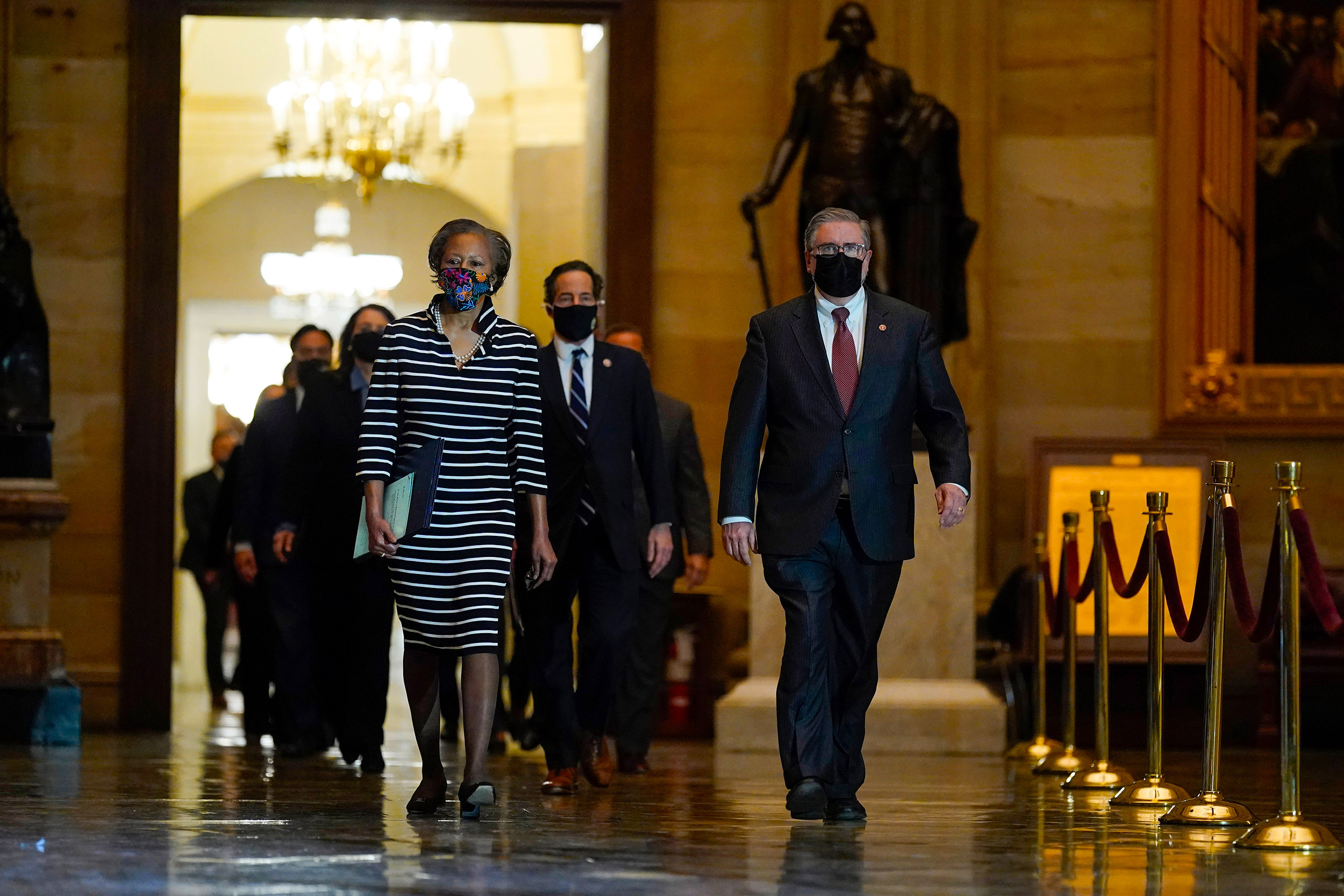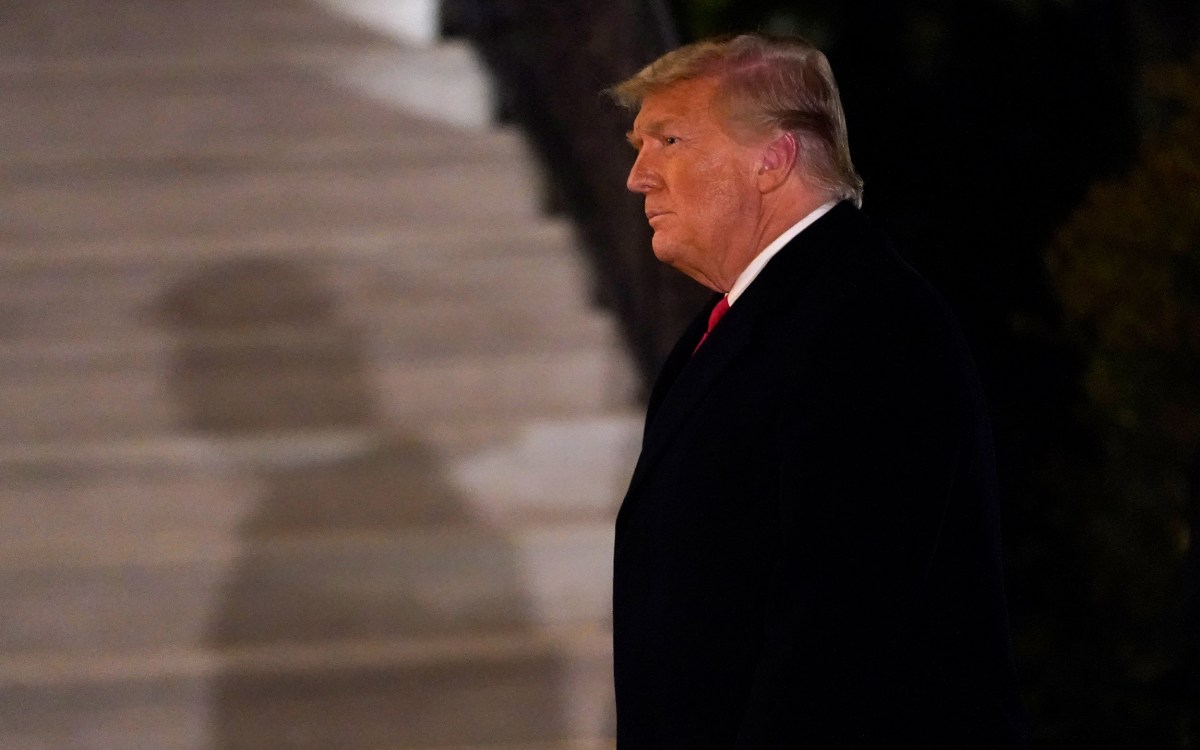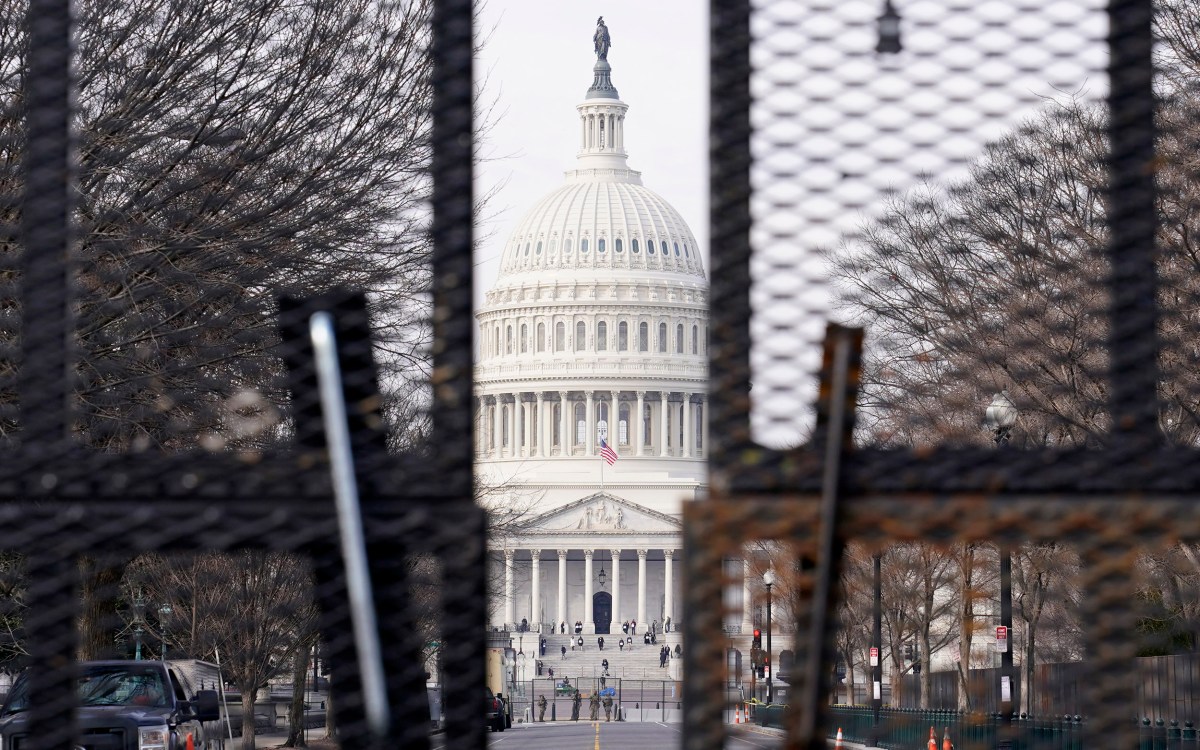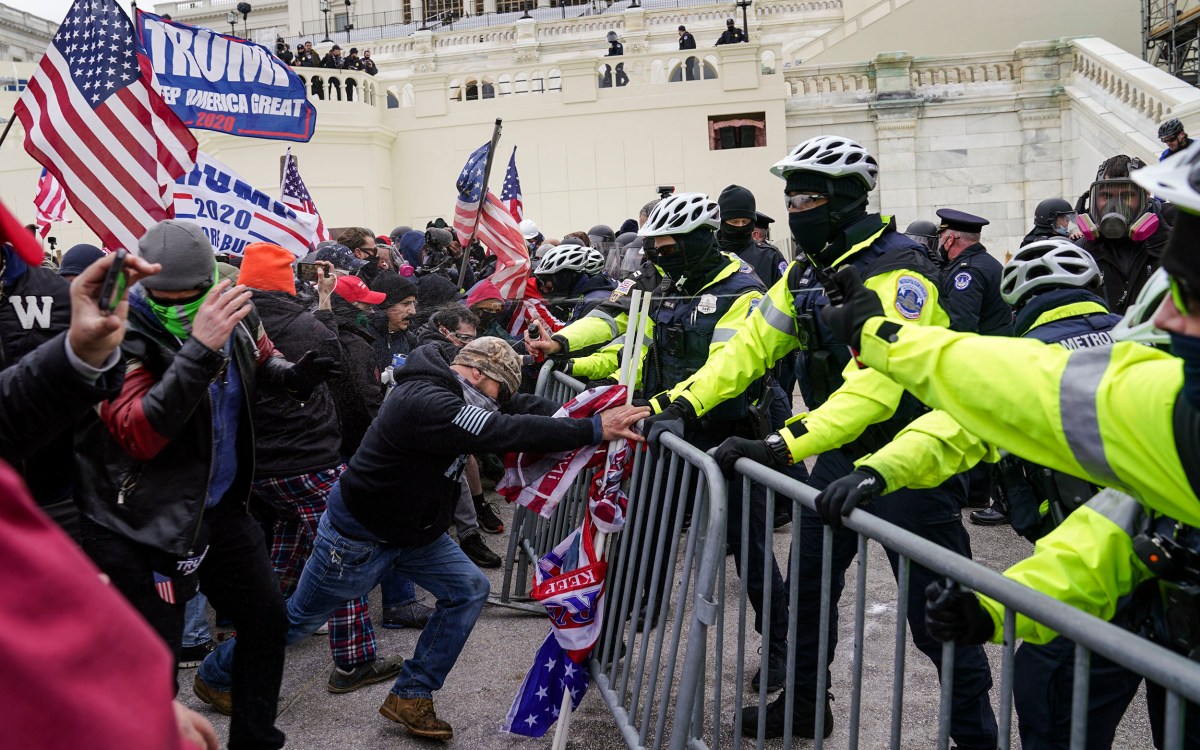
Clerk of the House Cheryl Johnson along with House Sergeant-at-Arms Tim Blodgett lead the Democratic House impeachment managers as they walk through the Capitol on Jan. 25 to deliver to the Senate the article of impeachment.
AP Pool Photo/J. Scott Applewhite
What to look for at Trump’s impeachment trial
Law Professor Jeannie Suk Gersen discusses potential arguments, precedents
The U.S. Senate will try former President Donald J. Trump Tuesday on charges that he incited the deadly Jan. 6 attack on the Capitol in which hundreds of his supporters ransacked the building, attacked police, and threatened to harm lawmakers who refused to declare him the 2020 election winner.
Trump is the first president to be impeached for a second time and will be the first to be tried after leaving office. To convict, House Democrats have the difficult task of persuading two-thirds of the Senate, now evenly split 50-50 between parties, that what Trump did — and didn’t do — in connection with the insurrection was a grave violation of his oath of office and a dereliction of his constitutional duties. They also seek to disqualify him from ever holding public office again. In a memo, Trump’s defense attorneys say the Senate has no authority to try ex-presidents, that he was denied due process in the Jan. 13 impeachment hearing, and that his remarks to backers preceding the attack were protected speech.
Jeannie Suk Gersen, J.D. ’02, John H. Watson Jr. Professor of Law at Harvard Law School, specializes in constitutional law and criminal law and is a contributing writer for the New Yorker. She spoke with the Gazette about what’s likely in store and the future precedents the trial could set.
Q&A
Jeannie Suk Gersen
GAZETTE: Can you put this proceeding into some historical context? How unusual are some of the basic facts of this trial?
SUK GERSEN: First of all, the very site of the harm that occurred, which is the insurrection and the attack on the Capitol, the desecration of the Senate chamber, all happened in the exact location of the court of impeachment, namely the Senate. That’s pretty unusual, because in other instances, you wouldn’t have been talking about wrongdoing that is alleged where the actual locale of the harm at issue is the actual building and the room in which the court of impeachment will be considering the evidence. Also, here, the senators were among the parties who experienced the event at issue. So, in some ways, they are all witnesses to the event. They had to be evacuated from the Senate chamber. Another thing that’s unusual but not unprecedented is that the official in question, Donald Trump, is no longer in office. We don’t have an instance in which a president was tried while having left office, but we have instances in which other kinds of officials have been tried after they left office.
GAZETTE: Trump’s attorneys and his supporters say that because he’s no longer in office, the trial itself is unconstitutional and point to the fact that no former president has ever been tried as proof of its impropriety. The House impeachment managers argue Trump was impeached while he was still president and for actions he took as president, and that the constitution does not say only sitting presidents can be impeached. Is the constitutionality of this trial still a valid, open legal question?
SUK GERSEN: It is a question on which there is debate. The side that says that this is a valid trial even though the president has left office has the better argument. But the other argument, that this is an unconstitutional trial because an impeachment is for the purpose of removing an official, as opposed to punishing them in some other way, that argument is not frivolous. It’s not something you can just toss away as irrelevant. And in fact, the House impeachment managers, when they filed their brief, spent more than one-third of the pages of their brief addressing the constitutionality of holding a trial at all. So clearly, they consider it substantive enough to go into at great length.

GAZETTE: Since 45 of 50 Republican senators have already signaled that they believe it is “unconstitutional” to try a former president, it’s unlikely there will be the 67 votes required to convict. What value does this exercise have if the outcome is already predetermined?
SUK GERSEN: I consider that to be a very difficult quandary because how you might have thought of it on Jan. 6 and in the days that followed, when it was possible to remove him from office using impeachment, might be different from how you perceive the costs and benefits now that he’s left office, now that we know that 45 out of 50 Republican Senators are on the record saying that the trial is unconstitutional and therefore, we’re heading for a somewhat clear vote of acquittal. Now that we know that, I think the calculation might change as to what the point of all this is. I can understand people not being willing to just say, “We’re going to drop it now as a result of his having left office.” Imagine if a president did all kinds of very, very bad things on the very last day in office. Does that mean there’s no recourse, and there’s no accountability that the Congress can seek? That doesn’t make any sense just as a matter of common sense. So, on that view, it is responsible for the Senate to go ahead with the trial and hear the evidence, even knowing that there’s going to be an acquittal at the end of it.
But I also see and worry very much about the other side of the argument, and at some moments, I think the other side of the argument is better. Which is: After we see allegations of this extremely serious nature that go to the very fundamental idea of our democracy and a president’s role in it, we should avoid having an acquittal because, of course, it’s going to create a message and the ability to say: “You see. The Senate didn’t think he did anything wrong.” And all of the theories of election fraud that we know to be false will have further life through the meaning of an acquittal that people are able to imbue.
GAZETTE: What do the briefs suggest about what to expect from each side?
SUK GERSEN: Given the [briefs for] the two sides disagree on the facts, and their context and meaning, there will be debate among the senators about what evidence should be presented. And of course we can say, “We know the facts. We all watched the news and watched it happen in real time.” But what we watched is CNN or Fox News or news reporting about it. There are things that much of the American public doesn’t know about in detail. So I think there will be debate about how much video evidence — especially if it seems pretty damning or if it will cause people to have a strong reaction — and how prejudicial it might be toward Trump, and how probative it is. There will be debate about whether it should be kept out. There are no preexisting and binding rules here about what evidence will be allowed. The Senate gets to decide. In the first impeachment, we had no testimony and that could happen this time. We could see a trial that’s very short: Perhaps because there’s going to be an acquittal, we don’t need to drag it out. Or, we could see a trial that’s longer: Precisely because there’s going to be an acquittal, this is the only chance to really communicate to the American people the facts and meaning of what happened.
GAZETTE: Since getting 17 Republican senators to convict appears out of reach, does that incentivize the Democrat House managers to use their time as an opportunity to lay out their case in as vivid detail as they can to see if they can at least persuade the public, who may then pressure their own elected officials?
SUK GERSEN: They might do that. And what’s very worrisome about it is, after all that, no matter how damning that evidence could be, and how serious the offense is, if you get an acquittal, that’s a “not guilty” in terms of how it will be received by half the country. Do we want to have that happen, where days and days of extremely damning evidence is presented and then it’s a not guilty? Or, do we want those facts to really come to light anyway, so that the public has a chance to consider it? Whatever happens in the court of impeachment will have meaning for the American public in terms of how they think the rightness or wrongness of what occurred should be assessed.
GAZETTE: In their brief, the House managers cite the necessity to impeach and convict as both a punishment to Trump, but also as a deterrent for future presidents. If Trump is acquitted, does that effectively render the charge “incitement to insurrection or rebellion” by a future president no longer an impeachable offense?
SUK GERSEN: No, I don’t think so. Many senators may be voting to acquit because they don’t think that the Senate has jurisdiction to try him. So I don’t think that we’re going to be able to read any acquittal in a substantive way to say that future presidents can do this.
GAZETTE: Will we know whether someone’s vote to acquit is based on the merits of the case or on this jurisdictional issue?
“Whatever happens in the court of impeachment will have meaning for the American public in terms of how they think the rightness or wrongness of what occurred should be assessed.”
SUK GERSEN: Because the Senate has control over how to structure things, it could ask each senator to say what the basis is, but that is not likely to happen. In fact, it will serve many senators to not ask, because they can hide behind the idea that this was a jurisdictional objection as opposed to an objection to the substantive charges. In other words, they could tell themselves or tell others, “Of course, I think what he did was inexcusable. But the prior question was ‘Do we have jurisdiction?’ and so, I used my vote to express my view that we didn’t have jurisdiction to begin with.”
GAZETTE: What legal precedents could be established by this trial?
SUK GERSEN: We have at least one prior, clear Senate precedent for trying a former official after he has left office. That’s the William Belknap case in 1876. So this will be a second case where the Senate is trying someone after they have left office and furthermore, it’s something one can do not just with an official, but with a president. So after this case, I think it will be harder to say the Senate doesn’t have jurisdiction, even though we’re going to see a whole bunch of senators voting to acquit on that basis.
GAZETTE: Could Trump have any criminal liability if in the coming weeks evidence emerges that he funded or helped organize the insurrection, provided material aid like information, or ordered police and the military not to adequately prepare or defend the Capitol in a way that was appropriate given the pre-Jan. 6 intelligence?
SUK GERSEN: All of those are big “ifs,” and the question is predicated on “ifs” we haven’t seen established yet but could be. Yes, if there is evidence that he coordinated, that he knew about the attack in advance and took steps to make it more likely to happen, that he purposefully didn’t help to put down the attack while it was going on, or that in advance he made it so that there would be a security failure, that he contributed to that on purpose. Those are very, very big ifs. So far, we don’t know that there’s evidence of that. If law enforcement had evidence of that, perhaps they would have shared it with the public, but perhaps they would not have. So it’s hard to say, but there likely won’t be criminal enforcement activity on this case against Trump without more than what we do know.
To me, the main complication is if we find out further evidence that makes the case against Trump stronger than it is now, such that it could become a criminal matter against Trump. And we’ll have had a Senate acquittal, which of course doesn’t technically preclude any criminal indictment, but the country may understand a Senate acquittal to mean “not guilty” for criminal law purposes. And then you’ve got the Biden Justice Department bringing a case anyway? The optics of that would not be good; the social meaning and the political meaning of that would be pretty bad.
GAZETTE: The Democrats have argued that if stirring up deadly violence against Congress to prevent the transfer of power doesn’t warrant a president’s impeachment and conviction, then nothing does. Is there any truth to this framing? Is the utility of impeachment as a check on presidential misconduct on the line?
SUK GERSEN: I very much think there is truth to that. If we didn’t have the jurisdictional doubt that some people have and still there’s an acquittal, then I would 100 percent think: What does this really say about impeachment as a mode of accountability for presidents? But the message is a little bit less dire because of the “out” that some senators have by emphasizing the jurisdictional reason for their acquittal vote. On the other hand, that raises some troubling questions about the incentives to save all official wrongdoing for the last minute, knowing that there’s no way one can be held accountable for them. And the situation in which somebody loses an election in November and then they have until January to do all kinds of bad things, that will be a recurring situation and a temptation that we don’t want to put out there.
Interview has been edited for clarity and length.








